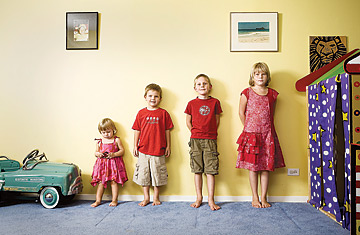Living in the shadow of an older sibling can be a heavy burden. It can be hard following that brilliant, outgoing, lovable older brother whom everyone seems to know and adore. Even though being the middle or youngest child is hard at times, it comes with some benefits, just like every position in the family.
Birth order theory is the idea that a person’s position in her family determines personality traits. According to this theory, the oldest child is the most driven and motivated. She is often organized and responsible, making her a leader of the family. Because she is expected to take care of younger siblings and set a good example, she often is the smartest and most well-behaved. Many of these traits come from the fact that the first-born is given undivided attention from the day she is born until the next child is born. Once the attention is off her, she feels that they must prove to her parents that she is worthy of attention.
“My oldest brother definitely takes the lead in the family,” said sophomore Claire Dinan. “He is really ambitious and he gets the best grades of anyone in my family.”
The typical youngest child is often the spoiled one. She usually gets the most attention and is used to getting what she wants. Often she is manipulative and attention-seeking, as well as persistent and affectionate.
“I think that I am the typical youngest child. I think I know how to get my parents to let me get what I want,” said senior Veronica Battersby.
The middle child is often squeezed between these two huge personalities. When the youngest and oldest children clash, the middle child is there to keep the peace. He is often flexible and has no problem “going with the flow.” He frequently is outgoing and competitive.
“My brother always plays peacemaker in my family,” said sophomore Kara Peltola, “and he hates when fights aren’t resolved.”
An only child is a whole different story. Since she grows up with constant attention, she tends to exhibit some of the same traits as an oldest child. She is often outgoing and personable, causing her to be liked by adults. Also she is frequently a perfectionist and very creative.
Although many families exhibit this theory perfectly, that is not always the case. Many families do not even follow it at all. So, next time you are fed up with always following in the footsteps of that obnoxiously motivated older sibling, remember that you have some strengths that they do not have.

